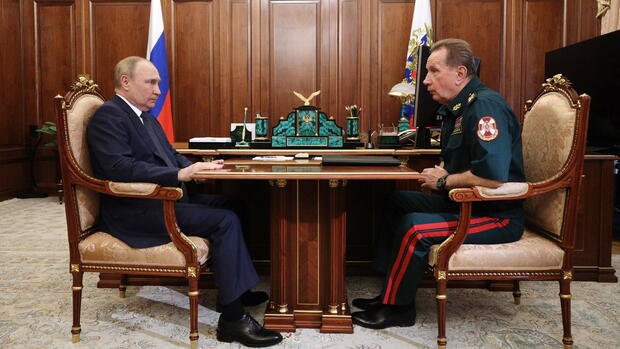President Vladimir Putin (left) having a conversation with General Viktor Zolotov, head of the National Guard.
(Photo: IMAGO/ITAR-TASS)
Berlin During the confrontation between the Russian military and the Wagner mercenary group, the focus is on the National Guard. President Vladimir Putin established the force in 2016 specifically to combat uprisings inside the country. Purely in terms of numbers, the National Guard is far superior to the units of Wagner founder Yevgeny Prigozhin.
When it was founded almost exactly seven years ago, Putin had set a target of 350,000 to 400,000 guards. From the point of view of military observers, the actual strength should be around half of the announced personnel. But that would still be significantly more than the approximately 25,000 Wagner mercenaries that Prigozhin led from the Ukraine to Russia.
British intelligence released an assessment of the situation on Saturday morning, showing that the loyalty of the Russian security services, and especially the National Guard, will be crucial in the coming hours to determine the course of the crisis. This represents “the most significant challenge for the Russian state in recent times”.
Experts have no doubts about the loyalty of the National Guard. Putin entrusted General Viktor Zolotov with the leadership of the unit directly reporting to him. Margarete Klein wrote in an analysis by the Stiftung Wissenschaft und Politik (SWP) that he was one of his closest confidants. “In the event of a conflict with sections of the elite, Putin has direct access to a paramilitary organization loyal to him.”
Officially, the Guard was established to suppress illegal demonstrations and fight terrorism and insurgency. In addition to special units from the police and border guards, tens of thousands of soldiers equipped with helicopters, tanks and rocket launchers serve in it.
From the point of view of Western observers, the military equipment may also have the background that Putin wanted to create a counterweight to the regular army. Defense Minister Sergei Shoigu was not happy about the formation of the National Guard, said an observer familiar with the power structure in the Russian military apparatus. He had to take this as distrust of himself. “Rightly.”
Also read on this topic:
Even if the defense minister was loyal, he still holds a strong position in the government, which Western observers could see as a risk for Putin. In the now escalating conflict, Shoigu is likely to be one of the losers, as Wagner boss Prigozhin attacks the minister personally.
He blames him for allegedly denying the mercenaries ammunition and military equipment. In addition, according to the Russian government’s most recent decree, irregular units like Wagner should have been integrated into the army and thus placed under Shoigu’s command.
His guard forms a counterweight to the regular Russian army.
(Photo: IMAGO/ITAR-TASS/ Sipa USA)
If the National Guard now stops the revolutionizing Wagner mercenaries, then Putin’s position should be strengthened. After all, the force under his command would stop Prigozhin – and not Shoigu’s regular army. Putin would demonstrate that he holds power in Russia in his hands.
According to Western experts, the National Guard was only initially involved in the war in Ukraine. She was assigned the role of maintaining calm in Kiev and assisting in the arrests of members of the government. After Russia had to drop plans to capture the Ukrainian capital, the National Guard withdrew. Since then, they have not been involved in combat operations.
More: Follow the latest developments in the news blog here
